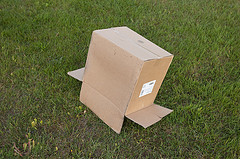| pros | cons |
|---|---|
| You can edit your documents from any location with web access, and don't need to carry them around on memory sticks/email them to yourself. It can also act as additional backup. | The editing can be quite slow, especially on older machines or slower internet connections. |
| Lots of different people can work on a document together without needing to keep emailing between each other. Changes made by individuals are logged (i.e. there's version control) and can be viewed later. | You can't trust Google to hold things forever, or in the same format. It's better as a temporary/pro-tem tool, than as a long-term storage solution. |
| There's an in built chat window, so you can discuss with collaborators as you type. (The cpd23 organising crew used this to hold remote meetings) | While there are word processing, spreadsheet and presentation tools, and the option to import and export MS Office formats, the formatting won't carry over precisely between the Google and MS versions. |
| The spreadsheet tool also works as a form/survey tool, which sends its results into a Google spreadsheet. That's really useful for sign-up forms, evaluation surveys, etc. |
 |
| drop |
They're used for registering participants in several events/programmes, such as Library Day in the Life and the Library Routes/Roots project. This lets participants sign themselves up, and visibly, thus saving the time and energy of the organisers. The by product is that the time and energy of the organisers can be diverted into cleaning up the wiki when there have been accidental formatting errors and deletions. I don't think that wikis, as currently used, are necessarily the best tool for this sort of use, but they are at least quick and easy.
 |
| box |
And here's a thing: using a wiki to organise your Chartership work.
Lastly, Dropbox. I have an account (maedchenimmond at gmail if anyone has anything to share). I know it's there. I haven't actually *used* it yet, but I'm sure that will change.

0 comments:
Post a Comment